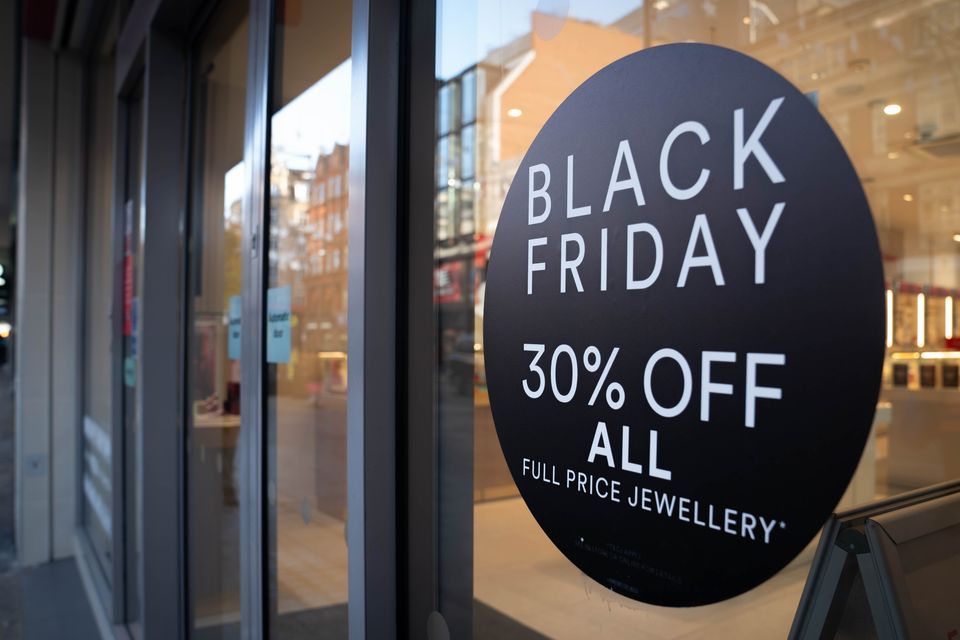Your Questions Answered: ‘Can an influencer be taken to task for promoting a poor quality coat?’
Stock image: Retailers promoting Black Friday deals (James Manning/PA)
Q I bought a coat from an online fashion retailer last week after a lady I follow on Instagram posted about how amazing the quality was. I shared the post with my friend, who then bought the same coat. When our coats arrived, the quality was awful: they had no lining and the front buttons were loose. We are in the process of complaining to the business, but I feel scammed by the lady who promoted it as the best quality she’d ever seen. Is this a breach of the new rules for influencers?
Andrea, Co Westmeath
A If the influencer was paid to promote the coat, she should have disclosed that by using #ad – or #gifted if she received the coat for free. Influencers are considered traders, and under the Consumer Protection Act 2007, it is an offence for a trader to mislead a consumer. We have new guidance on how influencers should label ads, and we strongly encourage all influencers, agencies and brands to read it at ccpc.ie/business. If you feel you’ve been misled by an influencer, you can report the matter to us or to the ASAI.
You were right to contact the business about this. When you buy online, you have a 14-day cooling-off period that starts when you receive an item. You don’t have to give a business a reason for cancelling the purchase under this, as it is an EU-wide right. If more than 14 days have passed, you may still be entitled to a refund, repair, replacement or price cut if you’ve bought from anywhere in the EU and the item is faulty or doesn’t look as advertised.
‘A retailer wouldn’t let me use a €50 voucher in Black Friday sale’
Q I have a €50 gift voucher for an online shop and was waiting to use it in the Black Friday sales. When I went to checkout and added in the voucher code, it said that vouchers couldn’t be used against Black Friday offers. Can the business decide how it accepts a voucher?
Anthony, Co Kildare
A A business can attach their own terms and conditions (T&Cs) on the use of gift vouchers, which can include limitations on usage, including now allowing a voucher to be redeemed on discounted goods. Read the T&Cs of the voucher and see if there’s anything about how you can or can’t use it.
When someone buys a gift voucher, they’re entering into a contract with the seller. If there’s nothing in the T&Cs about when you can use the voucher but the shop isn’t allowing you to use it to make a purchase, this could be considered a breach of contract. Contact the business and inform them that they must honour their own T&Cs.
If this fails, send the retailer a formal written complaint outlining how you’d like the matter resolved. For instance, do you just want to be able to use the voucher or do you want a refund? Beyond that, if the business is based in Ireland, you can always use the Small Claims Court. It costs €25 to take a case.
Don’t forget you do have many other rights when it comes to gift vouchers. Since 2019, gift vouchers must be valid for at least five years. A business can’t limit the number of gift vouchers you can redeem in one transaction, and you also don’t have to use the voucher in one go.
‘I sent a faulty smartwatch back to the manufacturer for repair but it’s still not working. What are my rights?’
Q I bought a smartwatch before the summer of 2022, but it recently stopped working. I contacted the manufacturer and sent the smartwatch to them to be fixed. But when it came back it was still not working. I assume the warranty has expired now but I spent a lot of money on it at the time so I surely have rights?
Brianna, Co Kerry
A The good news is that warranty or no warranty, you have rights under consumer law. Warranties are a bonus and cannot take away your statutory rights as a consumer. You purchased the smartwatch before the introduction of the new Consumer Rights Act in November 2022, but your fundamental rights are the same: goods sold must be as described, fit for purpose and of merchantable quality. If an item develops a fault and it’s not due to misuse, accidental damage or wear and tear, you’re entitled to a repair, replacement or refund.
When you purchase an item, your contract is with that seller. It’s unclear from your email whether you bought the smartwatch from the manufacturers or a separate retailer, but either way, as long as there was a fault present in the watch before you sent it away to the manufacturer, your rights still stand.
Your next step should be to write to the seller and explain the issue. Include proof of purchase (if you have it) and tell them how you would like the problem to be resolved.
If this doesn’t fix the situation to your satisfaction, you have the option of lodging a claim against the business with the Small Claims Court, which deals with claims up to a value of €2,000.
Send your questions to g.monaghan@independent.ie







.jpg)





.jpg)

